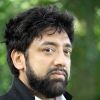
Professor S. Sayyid
- Position: Professor of Social Theory & Decolonial Thought
- Areas of expertise: Decolonial thought; poststructuralist political theory, critical Muslim studies; analysis of Islamophobia and racism; historical and relational macro-sociology
- Email: S.Sayyid@leeds.ac.uk
Profile
I read world history and write political theory. I was Head of the School of Sociology and Social Policy from 2017 to 2023. Before joining Leeds on a five-year University Research Fellowship, I worked at universities in London and Manchester.
I have a first degree in International Relations, a Master's in Ideology and Discourse Analysis, and my doctorate was in “continental” political theory. One of the ironies of my academic career is that I have found myself mainly working in sociology departments. Perhaps, then, it is not that surprising that my work is interdisciplinary.
In 2010, I had an opportunity to take time off from Leeds and was appointed Professor and the inaugural director of a newly formed research centre in Adelaide, Australia. Intellectually, my time in Australia was spent developing the field of Critical Muslim Studies.
Since returning to the UK, I have continued my work in Critical Muslim Studies with the launch of the interdisciplinary international academic journal: ReOrient, the publication of the book Recalling the Caliphate and a podcast, Radio ReOrient, which is now hosted by NBN, and a blog ReOrientations, as well as series of international symposia and workshops.
My previous monograph A Fundamental Fear has had a rather curious reception. It has helped to transform the way in which Islamism is analyzed; it has been translated into several languages, and it is in its third edition, but since 2006, it has been banned by the Malaysian government. The ban is based on British colonial legislation, which allows for the proscription of publications deemed to be, among other things, prejudicial to public morality… which I suppose can be seen as an example of impact.
More prosaic instances of impact, however, are provided by my frequent briefing (including writing commissioned reports) to senior government officials and ministers and contributions to national and international media. I have been interviewed and contributed to national and international broadcasters' programmes, including ABC (Australia), BBC, CBC (Canada), Press TV (Iran), Channel Four (UK), and ORF (Austria). I have also contributed frequent opinion pieces to newspapers in this country and abroad.
Research interests
The series of questions that animate my research across various mediums revolve around the processes by which systems of societies are formed and develop through history. All my publications, research bids, and invitations to speak are attempts at exploring this process of world-making and its implications. These explorations have two main dimensions. One dimension arises from theoretical issues and is organized around the relationship between discourse theory and decolonial thought. In particular, my emphasis has been on exploring the constitutive interplay between rhetoric and social order. At a substantive level, I study specific instances of the process of world-making, such as the part played by racism in the formation of modern societies, investigations of alternative worlds signalled by the various Islamist projects, or the constitutive role of rhetoric in the formation of collective identities. The second dimension of my research has focused on racism and its role in the way we understand the world; more specifically, this thread is located in the field of Islamophobia Studies.
I am the Founding Editor of ReOrient
I am the founding Vice President of the International Islamophobia Studies and Research Association (ISSRA)
Some past research projects include:
- The semantics of tolerance and (anti-) racism in Europe: public bodies and civil society on a comparative perspective
- Countering Islamophobia through the development of best practice in the use of counter-narratives in EU Member States
Primary investigator (PI)
Co-investigator (Co-I)
Qualifications
- B.A (Hons) in International Relations
- M.A (Hons) in Ideology and Discourse Analysis
- PhD in Government

